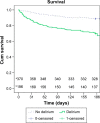Dementia and delirium, the outcomes in elderly hip fracture patients
- PMID: 28331300
- PMCID: PMC5354532
- DOI: 10.2147/CIA.S115945
Dementia and delirium, the outcomes in elderly hip fracture patients
Abstract
Background: Delirium in hip fractured patients is a frequent complication. Dementia is an important risk factor for delirium and is common in frail elderly. This study aimed to extend the previous knowledge on risk factors for delirium and the consequences. Special attention was given to patients with dementia and delirium.
Methods: This is a retrospective cohort study performed in the Amphia Hospital, Breda, the Netherlands. A full electronic patient file system (Hyperspace Version IU4: Epic, Inc., Verona, WI, USA) was used to assess data between January 2014 and September 2015. All patients presented were aged ≥70 years with a hip fracture, who underwent surgery with osteosynthesis or arthroplasty. Patients were excluded in case of a pathological or a periprosthetic hip fracture, multiple traumatic injuries, and high-energy trauma. Patient and surgical characteristics were documented. Postoperative outcomes were noted. Delirium was screened using Delirium Observation Screening Scale and dementia was assessed from medical notes.
Results: Of a total of 566 included patients, 75% were females. The median age was 84 years (interquartile range: 9). Delirium was observed in 35%. Significant risk factors for delirium were a high American Society of Anesthesiology score, delirium in medical history, functional dependency, preoperative institutionalization, low hemoglobin level, and high amount of blood transfusion. Delirium was correlated with a longer hospital stay (P=0.001), increased association with complications (P<0.001), institutionalization (P<0.001), and 6-month mortality (P<0.001). Patients with dementia (N=168) had a higher delirium rate (57.7%, P<0.001) but a shorter hospital stay (P<0.001). There was no significant difference in the 6-month mortality between delirious patients with (34.0%) and without dementia (26.3%).
Conclusion: Elderly patients with a hip fracture are vulnerable for delirium, especially when the patient has dementia. Patients who underwent an episode of delirium were at increased risk for adverse outcomes.
Keywords: adverse outcomes; complications; delirium; dementia; elderly; hip fracture.
Conflict of interest statement
Disclosure This research is funded by an “unrestricted grant” by the Amphia fund for innovation. The author reports no conflicts of interest in this work.
Figures
Similar articles
-
Elderly patients with a hip fracture: the risk for delirium.Appl Nurs Res. 2003 May;16(2):75-84. doi: 10.1016/s0897-1897(03)00012-0. Appl Nurs Res. 2003. PMID: 12764718
-
Precipitants of Delirium in Older Inpatients Admitted in Surgery for Post-Fall Hip Fracture: An Observational Study.J Frailty Aging. 2018;7(1):34-39. doi: 10.14283/jfa.2017.37. J Frailty Aging. 2018. PMID: 29412440
-
Sex Differences in Hip Fracture Surgery: Preoperative Risk Factors for Delirium and Postoperative Outcomes.J Am Geriatr Soc. 2016 Aug;64(8):1616-21. doi: 10.1111/jgs.14243. Epub 2016 Jul 7. J Am Geriatr Soc. 2016. PMID: 27384742 Free PMC article.
-
Intra-operative blood transfusions raise the risk of postoperative delirium and impede functional recovery in elderly hip fracture patients: a propensity score-matched study.J Orthop Traumatol. 2025 Feb 28;26(1):12. doi: 10.1186/s10195-025-00825-2. J Orthop Traumatol. 2025. PMID: 40021592 Free PMC article. Review.
-
Postoperative red blood cell transfusion strategy in frail anemic elderly with hip fracture. A randomized controlled trial.Dan Med J. 2016 Apr;63(4):B5221. Dan Med J. 2016. PMID: 27034188 Review.
Cited by
-
Effect of a Multicomponent Intervention with Tele-Rehabilitation and the Vivifrail© Exercise Programme on Functional Capacity after Hip Fracture: Study Protocol for the ActiveFLS Randomized Controlled Trial.J Clin Med. 2023 Dec 23;13(1):97. doi: 10.3390/jcm13010097. J Clin Med. 2023. PMID: 38202104 Free PMC article.
-
Postoperative delirium in geriatric patients with hip fractures.Front Aging Neurosci. 2022 Dec 22;14:1068278. doi: 10.3389/fnagi.2022.1068278. eCollection 2022. Front Aging Neurosci. 2022. PMID: 36620772 Free PMC article. Review.
-
What do hip fracture patients die from?Eur J Orthop Surg Traumatol. 2023 May;33(4):751-757. doi: 10.1007/s00590-022-03250-x. Epub 2022 Mar 24. Eur J Orthop Surg Traumatol. 2023. PMID: 35377075 Review.
-
Melatonin for prevention of postoperative delirium after lower limb fracture surgery in elderly patients (DELIRLESS): study protocol for a multicentre randomised controlled trial.BMJ Open. 2021 Dec 24;11(12):e053908. doi: 10.1136/bmjopen-2021-053908. BMJ Open. 2021. PMID: 34952881 Free PMC article.
-
Development and Validation of a Delirium Risk Prediction Model for Elderly Patients Undergoing Elective Orthopedic Surgery.Neuropsychiatr Dis Treat. 2023 Jul 21;19:1641-1654. doi: 10.2147/NDT.S416854. eCollection 2023. Neuropsychiatr Dis Treat. 2023. PMID: 37497306 Free PMC article.
References
-
- World Health Organization Ageing and health. 2015. [Accessed September 1, 2015]. Available from: http://www.who.int/mediacentre/factsheets/fs404/en/
-
- Bruce AJ, Ritchie CW, Blizard R, Lai R, Raven P. The incidence of delirium associated with orthopedic surgery: a meta-analytic review. Int Psychogeriatr. 2007;19(2):197–214. - PubMed
-
- Krogseth M, Watne LO, Juliebo V, et al. Delirium is a risk factor for further cognitive decline in cognitively impaired hip fracture patients. Arch Gerontol Geriatr. 2016;64:38–44. - PubMed
-
- Krogseth M, Wyller TB, Engedal K, Juliebo V. Delirium is a risk factor for institutionalization and functional decline in older hip fracture patients. J Psychosom Res. 2014;76(1):68–74. - PubMed
MeSH terms
Substances
LinkOut - more resources
Full Text Sources
Other Literature Sources
Medical


